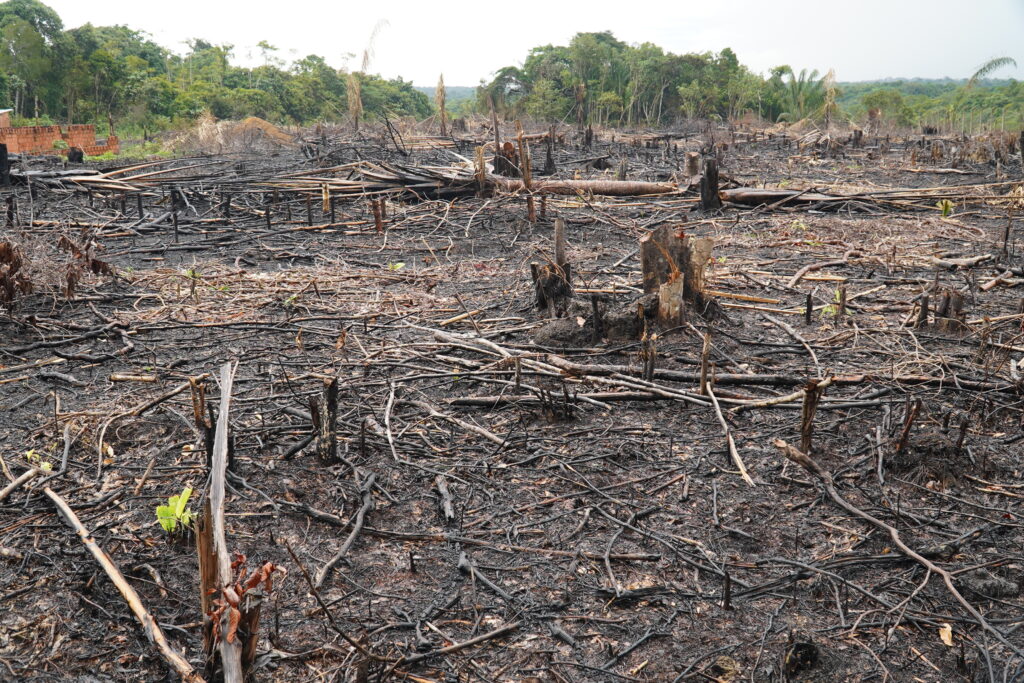Deforestation and forest degradation are destroying some of the earth’s most precious ecosystems and the natural resources that people depend on, in addition to fragmenting wildlife habitat. Together, they are also the second-largest source of global carbon emissions after the burning of fossil fuels. Certainly, Kosovo[1] is also facing the global challenge of deforestation, which is truly concerning.
Forest degradation can also damage or diminish other ecosystem services that a healthy forest provides—everything from flood control for surrounding communities to the availability of food and medicines derived from forest plants. When we remove healthy trees, some of the carbon that’s been stored in their fibers and surrounding soils gets immediately released into the atmosphere; some is released more slowly as wood products decay.
Fig 1. Deforestation with unpredictable consequences in Kosovo (Moti lokal , 2022)
Deforestation in Kosovo is one of the biggest environmental challenges of the last few decades, influenced by illegal logging, urbanization, and climate change. The consequences of this phenomenon are severe and long-term, affecting biodiversity loss as well as deteriorating air and soil quality. Humans are causing fires, uncontrolled deforestation, and illegal constructions in forested areas and in protected zones. While Kosovo may have a negligible global contribution, the damage is primarily felt within Kosovo itself. The annual greenhouse gas emissions in Kosovo for the year 2019 were estimated to be around 9,613 Gg (Gigagrams) of CO2, or approximately 9.6 million tons of CO2.
The causes of deforestation are: agriculture, urbanization, fires, population growth, mining and infrastructure, etc. Perhaps everyone has thought that our impact is insignificant to the world, which has led to a loss of collective sensitivity and the crossing of boundaries. We have acted irresponsibly towards water resources, fires, and deforestation, as is happening in Kosovo. Out of the 481,000 hectares of forests in Kosovo, according to the Forest Agency, around 10,000 hectares have been burned in the last six years, causing significant environmental damage and contributing to the increase in temperatures.
Temperatures are rising at the speed of highways – 10 degrees Celsius per century. Compared to burning, deforestation is considered the greatest ecological disaster humans cause to forests. Unregulated logging exceeds 90%, the construction of hydroelectric plants without proper criteria, the construction of highways without creating underpasses for wildlife, and amidst all these forest risks, Kosovo has only 45% forest cover. Kosovo’s forests host a rich fauna and flora that are crucial for the entire Balkan region. Our greenery represents about 25% of the flora of the Balkans and Europe.
“Average annual temperature in Kosovo according to different time periods”
The Forest Agency (PK) is responsible for matters related to the regulation of forests and forested lands, the administration and management of public forest lands, and forests in National Parks in Kosovo, except for those matters specifically assigned by law to another government authority. From 2000 to 2022, Kosovo has lost over 15,980 hectares of forests. In 2023, the Forest Agency (APK) received 2,465 reports of illegal logging.
The responsibilities of the Forest Agency :
- Implements forest legislation and regulations related to the administration of forests and forested lands.
- Through inventorying, monitors the development of forest resources in Kosovo.
- Reviews applications for the issuance of permits for the cutting of timber and non-timber products, issuing permits in accordance with the applicable regulations.
- Issues permits for cutting, selects and marks the trees for cutting, accepts the completed work, and issues permits for the transportation of timber.
- Issues permits for the collection of non-timber forest products.
To combat deforestation in Kosovo, it is recommended to strengthen laws and regulations for sustainable forest management, as well as increase awareness and education about the importance of forests in society.
[1] This designation is without prejudice to positions on status, and is in line with UNSCR 1244/1999 and the ICJ Opinion on the Kosovo declaration of independence.








